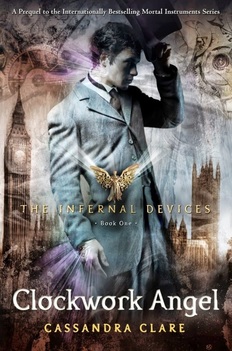A great novel is one that rewards you for your time. It doesn’t cheat you of the moments that you have spent so long waiting for. A character might suffer and lose everything for what they want – say, love, for example – but if that’s the case, it had better be worth it. The ending doesn’t have to be happy, but it does have to be fulfilling. A great novel is one that leaves you missing the world that you have inhabited through its pages.
It is impossible to write without reading. And in the case of historical fiction, it is impossible to write without reading a fair chunk of history. Here, in no particular order, are books I have enjoyed for their own sake, as well as their inspiration.
It is impossible to write without reading. And in the case of historical fiction, it is impossible to write without reading a fair chunk of history. Here, in no particular order, are books I have enjoyed for their own sake, as well as their inspiration.
Cassandra Clare, The Infernal Devices Series (Clockwork Angel, Clockwork Prince, Clockwork Princess)
|
Cassandra Clare's writing is generally engaging and enjoyable, but the characters from her Infernal Devices series are by far her best. Set in a Victorian England that is populated both by demons and by demon-hunting humans called Shadowhunters, The Infernal Devices follows the fortunes of Tessa Gray, Will Herondale, and Jem Carstairs, both in their personal misfortunes, and in their attempts to thwart the terrible plan of a deranged villain. The real joy of the novels is Will, who I will let speak for himself:
"Remember when you tried to convince me to feed a poultry pie to the mallards in the park to see if you could breed a race of cannibal ducks?" It was books that made me feel that perhaps I was not completely alone. They could be honest with me, and I with them." |
Elizabeth Gaskell. North and South.
|
If my novel is an homage to anything, it's to Gaskell's North and South. Written in the 1850s, it's the story of Margaret Hale, the daughter of a clergyman from Southern England, who moves north to the fictional town of Milton, and meets the brooding factory owner John Thornton. It is the story of technological and social upheaval, as well as their story, of love in the midst of conflict. There is no Victorian heroine with the strength of Margaret Hale, and few Victorian heroes with the passion of John Thornton. And if Victorian books aren't your thing, there's a magnificent BBC adaptation (because of course there is) with Thornton played by Richard Armitage (of Hobbit fame), and Margaret played by Daniela Denby-Ashe. Worth every minute of its four hours. |
Judith Flanders, Consuming Passions, The Victorian House, The Victorian City
|
So why does this author get three books mentioned? Because Judith Flanders is beyond amazing, that's why. If you want to feel like you're actually in the 19th Century, Judith Flanders is what you want. You float along in her immense catalogue of the minutiae of Victorian Life, feeling like you're poking your head into shops and drawing rooms, convinced that Charles Dickens himself will come around the corner at any moment. Consuming Passions details the things that Victorians bought, and opens with a description of the Great Exhibition of 1851, a major scene in my novel The Steel Lady. The catalogue of their purchases spans every moment of leisure, from clothes to ice skates to sheet music. The Victorian House makes me grateful for every appliance in my own home. It uses the spaces in a middle class home to detail the daily lives of all its inhabitants, particularly servants and women. It isn't always pretty. The Victorian City is a riot of detail. It moves you through the streets of Victorian London in a maze of sounds, sights, and repulsive smells. Its details, even compared to Flanders' other books, is almost overwhelming. |

